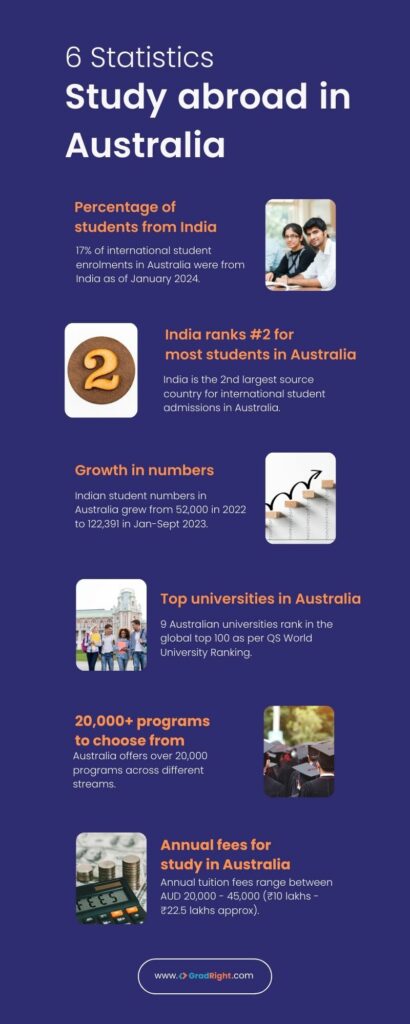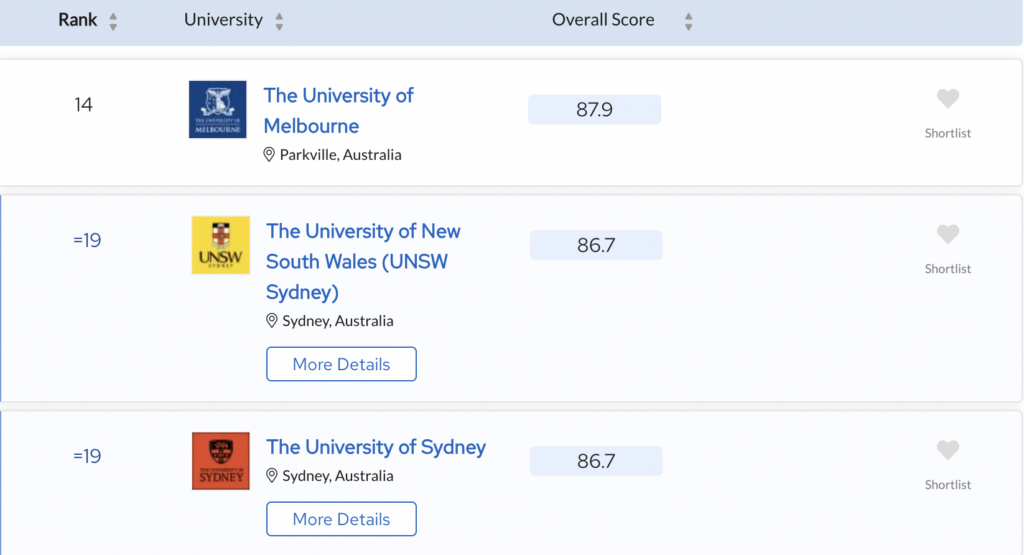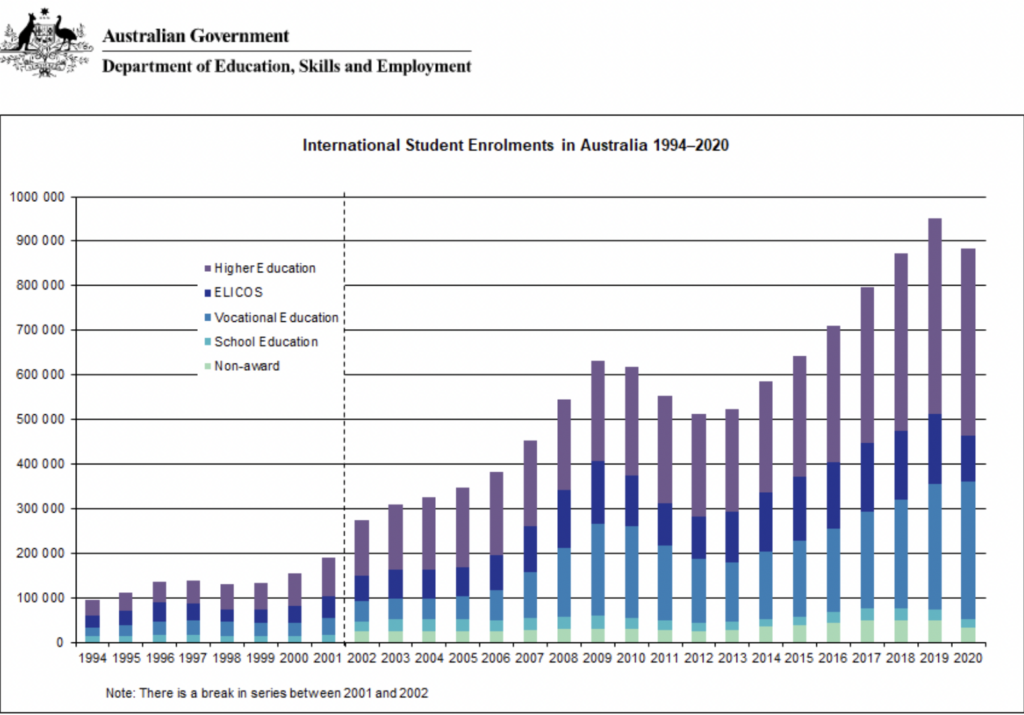Some facts:
As of January 2024, 17% of international student enrolments in Australia were from India.
According to the High Commission of India, India is the second-largest source country for international student admissions in Australia.
The number of Indian students choosing Australia for higher education has been steadily increasing. From a little over 52,000 Indian students in 2022, the number increased to a whopping 1,22,391 in the January-September 2023 period.
But why?
According to the latest QS World University Ranking, 9 of the Australian universities rank under 100 globally.
Humanities, medicine, engineering and technology, business, healthcare, data science, and renewable energy—Australia offers over 20,000 programs in various fields.
A broad range of tuition fees for the best courses to study in Australia can be between AUD $20,000 to AUD $45,000 per year (approximately ₹10 lakhs to ₹22.5 lakhs), which is quite affordable for many students.
Scholarship options are available for Indian students, offered by the Australian Government and some universities. Explore some scholarship options here.
Many Australian student visas allow you to work part-time while studying, which is a great way to manage your living expenses.
From the excitement of starting a new adventure to the calmness of knowing you’ve made a great choice, there lies a major step — finding out the answer to ‘what is the best course to study in Australia’.

So, your journey to find the best course to study in Australia begins here.
Top Courses To Study In Australia
Below, you will find the best courses to study in Australia for international students at various levels of education.
Best Courses To Study In Australia After 12th
If you’re fresh out of school or about to finish, here are the top streams and programs you can explore to study in Australia.
Top Engineering & IT Courses to Study in Australia
The table below shows 5 best undergraduate courses to study in Australia for international students, in engineering and technology.
| Course Name | Course Duration (Years) | Top University Offering the Course | QS World University Ranking | General Eligibility Criteria* |
| Bachelor of Engineering (Honours) in Mechanical Engineering | 4 | University of Melbourne | 14 | Typically, 70% or above in Physics, Chemistry, and Mathematics in Class 12 |
| Bachelor of Information Technology | 3 | Australian National University (ANU) | 34 | Typically, 65% or above in Mathematics and Science subjects in Class 12 |
| Bachelor of Engineering (Honours) in Electrical and Computer Engineering | 4 | University of Sydney | 19 | Typically, 75% or above in Physics, Chemistry, and Mathematics in Class 12 |
| Bachelor of Engineering (Honours) in Civil Engineering | 4 | Monash University | 42 | Typically, 70% or above in Physics, Chemistry, and Mathematics in Class 12 |
| Bachelor of Computer Science | 3 | University of New South Wales (UNSW Sydney) | 19 | Typically, 65% or above in Mathematics and a Science subject in Class 12 |
*The criteria may vary for different courses and universities. Please refer to the institutions’ official websites to get exact information. You can also connect with faculty and students from programs you love.
Top Medical Courses to Study in Australia
Australia’s world-renowned healthcare system offers excellent opportunities for aspiring professionals. Explore your options below for nursing, biotechnology, pharmacy, or veterinary science.
| Courses | Course Duration | Top University Offering the Courses | QS World University Ranking | General Eligibility Criteria* |
| Bachelor of Pharmacy and Management | 3 years | The University of Sydney | 19 | |
| Psychiatry | ||||
| Medical Science | The University of Adelaide | 89 | ||
| Clinical Science | ||||
| Bachelor of Nursing | ||||
| Bachelor of Medical Science | University of Melbourne | 14 |
*The criteria may vary for different courses and universities. Please refer to the institutions’ official websites to get exact information.
Top Commerce Courses to Study in Australia
Whether it’s learning the art of trading or analysing business economics, Australian universities have a plethora of courses to offer in this stream.
The country’s strong economy, which is packaged with affordable programs, is one of the many reasons why students across the globe prefer Australia for their higher education.
Here are some of the best courses to study in Australia for international students, in commerce.
| Courses | Course Duration | Top University Offering the Courses | QS World University Ranking | General Eligibility Criteria* |
| Accounting | 3 Years | University of Sydney | 19 |
|
| Marketing | 3 Years | |||
| Banking | 3 Years | |||
| Finance | 3 Years | University of New South Wales | 19 | |
| Business Economics | 3 Years | |||
| Business Analytics | 3 Years | |||
| Bachelor of Commerce | 3 Years | |||
| Marketing | 3 Years | Monash University | 42 | |
| Taxation | 3 Years | |||
| Financial Econometrics | 3 Years |
*The criteria may vary for different courses and universities. Please refer to the institutions’ official websites to get exact information.
Best Masters Courses To Study In Australia
Did you know?
In 2023, the number of Indian students studying abroad increased by 35%, reaching around 1.5 million. Most of these students, about 70%, were pursuing master’s.
So, if you’re planning to be one of them in the next admission cycle, here are some of the best masters courses to study in Australia under different streams.
| Courses | Course Duration | Top University Offering the Courses | QS World University Ranking | Eligibility Criteria* |
| Medicine/ Healthcare | ||||
| Graduate Certificate of Surgery | 6 months | University of Sydney | 19 (Side note – As per US News Subject Rankings 2023, The University of Sydney ranked 1st in Australia for Surgery) | A relevant bachelor’s degree. |
| Master of Nursing | 1 – 2 years | A registered nurse qualification with a minimum of a few years of experience (specific requirements vary). Some universities might require an undergraduate degree in Nursing. | ||
| Master of Medicine (various specialisations) | 4 – 6 years (variable) | The University of Queensland | 43 | A Doctor of Medicine (MD) degree or equivalent qualification with a minimum score of 65% or equivalent. Extensive experience as a medical doctor is usually required. |
| Master of Health Administration | 1 – 2 years | University of Western Australia | 72 | A relevant Bachelor’s degree in healthcare, business, or a related field with a minimum score of 65% or equivalent. Work experience in healthcare management might be preferred. |
| Engineering & Technology | ||||
| Master of Engineering in Mechanical Engineering | 1.5 – 2 years | University of Melbourne | 14 | A relevant Bachelor’s degree in Engineering with a minimum score of 65% or equivalent. Work experience might be preferred by some universities. |
| Master of Information Technology | 1 – 2 years | University of Sydney | 19 | A relevant Bachelor’s degree in Computer Science, Information Technology, or a related field with a minimum score of 65% or equivalent. |
| Master of Engineering in Computer Science | 1.5 – 2 years | Australian National University | 34 | A relevant Bachelor’s degree in Computer Science or a related field with a minimum score of 65% or equivalent. Some universities might require work experience or specific programming language skills. |
| Master of Engineering in Electrical Engineering | 1.5 – 2 years | The University of Queensland | 43 | A relevant Bachelor’s degree in Electrical Engineering or a related field with a minimum score of 65% or equivalent. Work experience might be preferred by some universities. |
| Master of Data Science | 1 – 2 years | University of New South Wales | 19 | A relevant Bachelor’s degree in Computer Science, Information Technology, Statistics, Mathematics, or a related field with a minimum score of 65% or equivalent. Strong quantitative skills are preferred. |
| Business & Management | ||||
| Master of Business Administration (MBA) | 1 – 2 years | University of Melbourne | 14 | A Bachelor’s degree in Business, Management, or a related field with a minimum score of 65% or equivalent. Work experience (minimum of 2-3 years) is often preferred. |
| Master of Marketing | 1 – 1.5 years | Monash University | 42 | A Bachelor’s degree in Business, Marketing, Communications, or a related field with a minimum score of 65% or equivalent. Some universities might require relevant work experience or marketing skills. |
| Master of International Business | 1.5 – 2 years | University of Sydney | 19 | A Bachelor’s degree in Business, Management, Economics, or a related field with a minimum score of 65% or equivalent. Some universities might require specific coursework in international business. |
*The criteria may vary for different courses and universities. Please refer to the institutions’ official websites to get exact information. You can also connect with faculty and students from programs you love.
Note: With 11,000 institutes and 20,000+ programs, Australia gives students the problem of choice-overwhelm. To bring order to this chaos, we built SelectRight.
Over 60,000 students have used it to find their best university. Here’s how you can use it.
How to Use SelectRight?
- Set Up Your Profile: Provide your personal details and educational history.
- Outline Your Needs: What kind of program, field of study, and university location are you seeking?
- Get AI-Powered Matches: SelectRight will suggest Australian programs that fit your criteria.
- Compare and Choose: Review the matches, consider costs, rankings, and what matters most to you.
- Talk to an Advisor: Get personalised advice and help with your applications.
Let’s get started finding the perfect program for you.

Don’t gamble on your future. Find your perfect university with SelectRight. Start exploring now.
Why choose Australia as a country for your higher studies?
At the beginning of this blog, we discussed why Australia is becoming a hot destination for international students. Let’s dive deep into some discussed points and explore new ones!
Top-Ranking Universities: 9 Australian universities rank in the top 100 of the 2024 QS World University Rankings, ensuring a world-class education recognized by employers globally.
Excellent ROI:
While the average tuition fee for international undergraduate students in Australia in 2020 was $30,840 AUD per year, part-time jobs can offer an average monthly salary of up to AUD 67,500. This translates to strong career prospects and earning potential.
A recent GradAustralia survey suggests that 88% of international students felt their Australian education would lead to a good job.
Multicultural Hub: With a diverse student population, Australia offers a vibrant and welcoming environment. In 2023, over 17% of international student enrolments were from India, highlighting its popularity among Indian students.
The graph below shows the constant increase in the number of international student enrolments in Australia.








